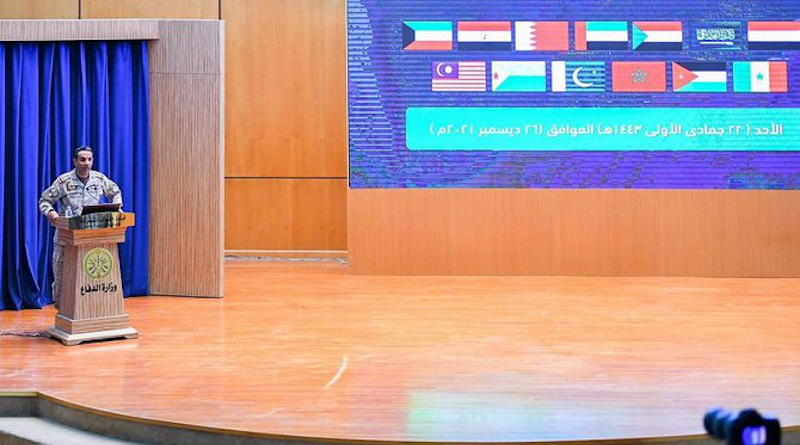
The Arab coalition on Sunday released footage and pictures it said provided evidence of Hezbollah and Iran’s involvement in Yemen’s seven-year war and the use of Sanaa airport as a missile launch site.
At a press conference in the Saudi capital, coalition spokesman Brig. Gen. Turki Al-Maliki showed footage of Hezbollah instructors training Houthis on how to use drones.
In some videos, boxes of drone parts can be seen stacked with some bearing Hezbollah’s logo.
Al-Maliki called Hezbollah “a cancer in Lebanon” that had initially affected the Lebanese before spreading outside the country.
“The terrorist organization Hezbollah has spread destruction in the region and the world,” he told reporters, adding that the Iran-backed group bore responsibility for targeting civilians in Saudi Arabia and Yemen.
In another video, the coalition said a Hezbollah leader was giving instructions to Abdullah Yahya Al-Hakim, the Houthis’ second-in-command who is on a UN sanction list for organizing coups and military operations to topple the government, and was also responsible for securing and controlling all routes in and out of Sanaa and the takeover of Amran governorate.
“The military sector of Hodeidah is very important. If Hodeidah falls, support for confronting the aggression will end,” the Hezbollah leader is heard saying. “The sea is the only gateway for the support to come. If we lose the sea, we will not get any support and the mujahideen will not come. We want a large crowd of mujahideen, we want to organize our ranks.”
Al-Maliki also offered footage and aerial surveillance that he said showed the militia were “militarizing” Sanaa airport and had turned it into a launch pad for ballistic missiles and and drones targeting Saudi Arabia.
The press conference comes a day after the international community strongly condemned a cross-border attack by the Houthi militia targeting the southwestern city of Jazan, killing two people and injuring seven on Friday.
Al-Maliki said that Iran fed sectarian ideology into Yemen, Iraq, Syria and Lebanon, that the Houthis were dependent on orders and instructions from the Iranian Revolutionary Guards Corps and they had adopted the regime’s sectarian ideology.
Regarding recent airstrikes in Sanaa, Al-Maliki said the coalition focused its operations on not affecting the operational capacity of Sanaa airport and the strikes targeted a drones depot.
He rejected claims made by the Houthis that they had besieged the port city of Hodeidah: “We are monitoring the movements of the Houthi militia around the clock.”
Al-Maliki said the Houthis’ attempts to control energy-rich Marib, one of the last remaining government strongholds, threatened the livelihoods of 3 million Yemenis, but that the coalition was committed to protecting civilians during its operations to support the army.
He also said that Iran’s ambassador to Sanaa Hassan Irloo, who died of COVID-19 last week, of leading the planning of military operations in Marib, and that the Houthis were denying permission for UN humanitarian planes to land.
The militia had launched 430 ballistic missiles and 851 armed drones at Saudi Arabia since January 2018, killing 59 Saudi civilians, Al-Maliki said, calling on the international community to stop the hostile acts.
The Houthis had also launched 100 booby-trapped boats and planted 247 sea mines, threatening maritime navigation, but coalition forces had been successful in securing navigation in the Red Sea.
Al-Maliki said more than 30,000 Houthis had been killed since the beginning of the year, adding: “We know the whereabouts of the Houthi leaders and warn them for the last time.”
Saudi Arabia’s initiative to end the Yemeni crisis, which was welcomed by the international community, was still on the table, he said, but the Houthis did not seek peace and had rejected all UN efforts to reach a political solution.
